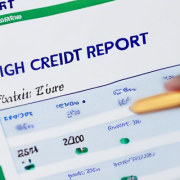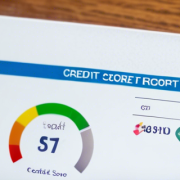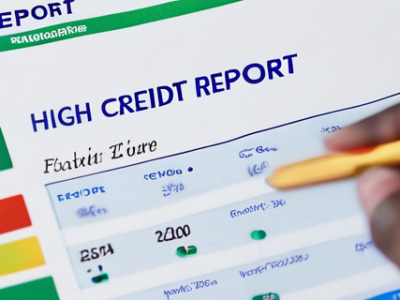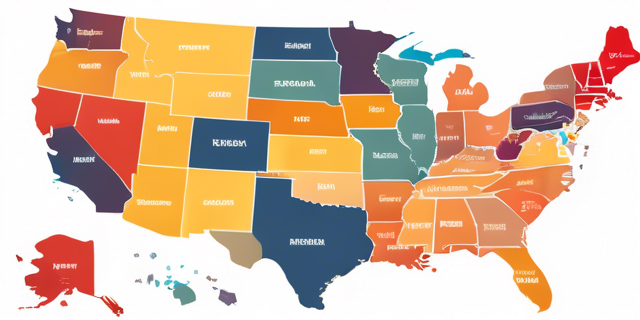What Credit Score Do You Need to Buy a House?

So, you’re thinking about taking the plunge and buying a house? Congratulations! Homeownership is a significant milestone and a great investment in your future. However, before you start browsing those real estate listings, there’s one crucial factor you need to consider: your credit score. Your credit score plays a pivotal role in determining your eligibility for a mortgage and the interest rates you’ll be offered.
In this article, we’ll dive deep into the world of credit scores and explore what score you need to buy a house. We’ll also provide you with valuable tips and strategies to improve your credit score, increasing your chances of securing a favorable mortgage and making your dream of homeownership a reality.
Understanding Credit Scores

Before we delve into the specifics of credit scores and mortgages, let’s first understand what a credit score is and why it’s so important.
What is a Credit Score?
A credit score is a three-digit number that represents your creditworthiness. It’s a numerical representation of your credit history, payment habits, and overall financial responsibility. Credit scores are calculated by credit reporting agencies, such as Experian, Equifax, and TransUnion, using complex algorithms that analyze your credit report.
Credit scores typically range from 300 to 850, with higher scores indicating a lower risk for lenders. A good credit score can open doors to better interest rates, higher loan amounts, and more favorable terms when applying for credit products, including mortgages.
Why is Your Credit Score Important for Buying a House?
When you apply for a mortgage, lenders will scrutinize your credit score to assess the risk of lending you money. A higher credit score signals to lenders that you’re a responsible borrower with a proven track record of making payments on time and managing your credit responsibly.
Conversely, a lower credit score may raise red flags for lenders, indicating a higher risk of default or late payments. As a result, lenders may deny your mortgage application outright or offer you less favorable terms, such as higher interest rates or stricter down payment requirements.
Credit Score Requirements for Mortgages
Now that you understand the importance of credit scores, let’s explore the specific credit score requirements for different types of mortgages.
Conventional Mortgages
Conventional mortgages are those that are not insured or guaranteed by the government. These types of mortgages typically have more stringent credit score requirements than government-backed loans.
Most lenders require a minimum credit score of 620 to qualify for a conventional mortgage. However, to secure the best interest rates and terms, you’ll generally need a credit score of at least 740.
FHA Loans
FHA (Federal Housing Administration) loans are mortgages insured by the U.S. Department of Housing and Urban Development (HUD). These loans are designed to make homeownership more accessible to borrowers with lower credit scores or limited funds for a down payment.
The minimum credit score requirement for an FHA loan is typically 580. However, if your credit score falls between 500 and 579, you may still be eligible for an FHA loan, but you’ll be required to make a larger down payment, usually 10% of the home’s purchase price.
VA Loans
VA (Veterans Affairs) loans are mortgages backed by the U.S. Department of Veterans Affairs and are available to eligible military members, veterans, and their spouses.
While the VA doesn’t have a specific minimum credit score requirement, most lenders typically require a credit score of at least 620 to qualify for a VA loan. However, lenders may be more lenient with lower credit scores if you have compensating factors, such as a low debt-to-income ratio or a substantial down payment.
USDA Loans
USDA (United States Department of Agriculture) loans are designed to help low- and moderate-income households purchase homes in eligible rural areas.
The minimum credit score requirement for a USDA loan is typically 640. However, like VA loans, lenders may consider compensating factors if your credit score falls below this threshold.
Improving Your Credit Score for a Mortgage

If your credit score doesn’t quite meet the requirements for the type of mortgage you’re seeking, don’t worry – there are steps you can take to improve it. Here are some effective strategies to boost your credit score:
1. Check Your Credit Reports
The first step in improving your credit score is to obtain copies of your credit reports from the three major credit bureaus (Experian, Equifax, and TransUnion). Review them carefully for any errors, such as incorrect personal information, accounts you didn’t open, or inaccurate payment histories.
If you find any errors, dispute them with the respective credit bureau. Correcting errors can have a positive impact on your credit score.
2. Pay Your Bills on Time
Payment history is the most significant factor influencing your credit score. Late or missed payments can severely damage your score, so it’s crucial to make all your payments on time, including credit card bills, loans, utilities, and rent.
Consider setting up automatic payments or payment reminders to ensure you never miss a due date.
3. Reduce Your Credit Utilization Ratio
Your credit utilization ratio, or the amount of credit you’re using compared to your total available credit, is another crucial factor in determining your credit score. Ideally, you should aim to keep your credit utilization ratio below 30% for each credit card and overall.
To lower your credit utilization ratio, you can either pay down your outstanding balances or request a credit limit increase from your credit card issuers (but only if you trust yourself not to overspend).
4. Avoid Closing Old Credit Cards
While it may seem counterintuitive, closing old credit cards can actually hurt your credit score. This is because it can shorten your average credit history length and reduce your total available credit, both of which are factors in calculating your credit score.
Instead of closing old cards, consider keeping them open and using them occasionally to maintain account activity.
5. Limit Hard Credit Inquiries
Every time you apply for new credit, such as a credit card or loan, the lender will perform a hard inquiry on your credit report. Too many hard inquiries in a short period can negatively impact your credit score.
Limit your credit applications to only what’s necessary, and space them out over time. Checking your own credit report or being pre-approved for offers typically results in a soft inquiry, which does not affect your score.
6. Consider a Credit-Builder Loan or Secured Credit Card
If you have a thin credit file or no credit history, you may want to consider a credit-builder loan or a secured credit card. These products are designed to help you establish or rebuild your credit.
With a credit-builder loan, you make regular payments to a lender, and the money is held in an account until you’ve paid off the loan. The lender then reports your positive payment history to the credit bureaus, helping you build credit.
A secured credit card, on the other hand, requires a refundable security deposit that serves as your credit limit. By using the card responsibly and making on-time payments, you can build a positive credit history.
7. Dispute Inaccurate Negative Items
If you find negative items on your credit report that you believe are inaccurate or outdated, you can dispute them with the credit bureaus. This process may take some time and effort, but successfully removing inaccurate negative items can significantly improve your credit score.
8. Become an Authorized User
Another strategy to build or improve your credit is to become an authorized user on someone else’s credit card account, ideally an account with a long, positive payment history and low credit utilization. As an authorized user, the account’s history may be added to your credit report, potentially boosting your score.
However, be cautious when using this strategy, as the primary account holder’s behavior can also negatively impact your credit if they mismanage the account.
9. Manage Your Credit Mix
Your credit mix, or the variety of credit accounts you have (e.g., credit cards, mortgages, auto loans), also contributes to your credit score. Lenders tend to favor individuals with a diverse credit mix, as it demonstrates their ability to handle different types of credit responsibly.
If you currently only have one type of credit account, consider responsibly adding another type, such as an installment loan or a credit card, to diversify your credit mix.
10. Be Patient and Consistent
Improving your credit score takes time and consistent effort. It’s essential to be patient and consistently practice good credit habits, such as making on-time payments, keeping credit utilization low, and avoiding excessive credit applications.
While some strategies may produce quicker results, such as disputing errors or becoming an authorized user, others may take several months or even years to fully reflect in your credit score.
Other Factors Lenders Consider
While your credit score is a crucial factor in determining your mortgage eligibility and terms, it’s not the only consideration lenders take into account. Here are some other important factors that lenders evaluate when reviewing your mortgage application:
1. Debt-to-Income Ratio (DTI)
Your debt-to-income ratio (DTI) is a measure of your monthly debt obligations compared to your gross monthly income. Lenders use this ratio to assess your ability to manage your monthly mortgage payments in addition to your existing debt obligations.
Generally, lenders prefer a DTI ratio of 43% or lower, although some may allow higher ratios if you have compensating factors, such as a larger down payment or significant cash reserves.
2. Down Payment
The size of your down payment plays a significant role in determining the terms of your mortgage. A larger down payment not only reduces the overall amount you need to borrow but also demonstrates your financial commitment to the property.
Most lenders require a minimum down payment of 20% for conventional mortgages to avoid the need for private mortgage insurance (PMI). However, some mortgage programs, such as FHA and VA loans, allow for lower down payments.
3. Employment History and Income Stability
Lenders want to ensure that you have a steady and reliable source of income to make your mortgage payments. They’ll typically review your employment history, current income sources, and income stability.
If you’re self-employed or have irregular income streams, you may need to provide additional documentation, such as tax returns, profit and loss statements, and bank statements, to verify your income.
4. Collateral (Property Value)
The property you’re purchasing serves as collateral for the mortgage loan. Lenders will order an appraisal to determine the home’s fair market value and ensure that it aligns with the purchase price.
If the appraisal comes in lower than the agreed-upon purchase price, the lender may require a larger down payment or adjust the loan amount accordingly.
5. Loan Type and Terms
The type of mortgage you choose and the associated terms can also impact your overall eligibility and interest rate. For example, adjustable-rate mortgages (ARMs) may have different credit score requirements than fixed-rate mortgages, and jumbo loans (those that exceed conforming loan limits) often require higher credit scores and more stringent qualifications.
6. Cash Reserves
Lenders may also consider your available cash reserves, which refer to the amount of liquid assets you have on hand to cover mortgage payments and other expenses in case of an emergency or job loss.
Having sufficient cash reserves can be seen as a positive factor by lenders, as it demonstrates your ability to weather financial storms and make your mortgage payments even if your income is disrupted.
Strategies for Buying a House with a Lower Credit Score
If your credit score doesn’t quite meet the typical requirements for a mortgage, don’t lose hope. There are still strategies you can employ to increase your chances of getting approved and securing a favorable mortgage:
1. Consider an FHA Loan
As mentioned earlier, FHA loans have more lenient credit score requirements compared to conventional mortgages. If your credit score falls below the conventional threshold, an FHA loan may be a viable option.
Keep in mind that FHA loans typically require a higher mortgage insurance premium (MIP), which can increase your overall housing costs.
2. Seek Out Lender-Specific Programs
Some lenders offer in-house mortgage programs or portfolio loans with more flexible credit score requirements. These programs may be designed for borrowers with unique circumstances or lower credit scores.
While the interest rates and terms may not be as favorable as those offered for borrowers with excellent credit, these programs can provide an alternative path to homeownership.
3. Increase Your Down Payment
A larger down payment can help offset the perceived risk associated with a lower credit score. By putting more money down upfront, you’ll reduce the lender’s exposure and potentially qualify for better terms or interest rates.
4. Obtain a Co-Signer or Co-Borrower
If you’re having trouble qualifying for a mortgage on your own due to a lower credit score, you may consider adding a co-signer or co-borrower with a stronger credit profile to your application.
However, it’s essential to understand the legal and financial responsibilities involved, as the co-signer or co-borrower will be equally responsible for the mortgage payments.
5. Explore Alternative Lending Options
In some cases, traditional lenders may not be able to accommodate your specific situation, even with compensating factors. If this is the case, you may want to explore alternative lending options, such as private lenders or portfolio lenders.
Keep in mind that these lenders may have higher interest rates and more stringent terms, so it’s crucial to carefully evaluate the costs and risks involved.
Additional Tips for Home Buyers
Beyond improving your credit score and understanding the mortgage qualification process, here are some additional tips to help you navigate the home-buying journey:
1. Get Pre-Approved
Before you start house hunting, it’s a good idea to get pre-approved for a mortgage. This process involves a lender thoroughly reviewing your financial situation, including your credit score, income, and debts, to determine how much you can borrow.
A pre-approval letter not only gives you a clear understanding of your budget but also shows sellers that you’re a serious buyer, which can give you an edge in a competitive market.
2. Work with a Reputable Lender
Choosing the right lender is crucial when applying for a mortgage. Research different lenders, compare interest rates and fees, and read reviews from previous customers.
Additionally, consider working with a mortgage broker who can shop around and compare options from multiple lenders on your behalf.
3. Prepare for Additional Costs
When budgeting for a home purchase, don’t forget to factor in additional costs beyond the purchase price, such as closing costs, moving expenses, and potential repairs or renovations.
These costs can add up quickly, so it’s essential to have a realistic understanding of your overall financial commitment.
4. Consider Future Plans
When choosing a mortgage, think about your long-term goals and plans. For example, if you plan to stay in the home for an extended period, a fixed-rate mortgage may be a better option to lock in a consistent monthly payment.
On the other hand, if you anticipate moving within a few years, an adjustable-rate mortgage (ARM) with lower initial rates could be more cost-effective in the short term.
5. Seek Professional Advice
The home-buying process can be complex and overwhelming, especially for first-time buyers. Consider seeking the advice of a professional, such as a real estate agent, mortgage broker, or financial advisor, to help guide you through the process and ensure you make informed decisions.
Conclusion
Buying a house is a significant financial milestone, and your credit score plays a crucial role in determining your eligibility for a mortgage and the terms you’ll receive. While the exact credit score requirements can vary depending on the type of mortgage and lender, most conventional lenders prefer a score of at least 620, with higher scores often resulting in more favorable interest rates and terms.
However, if your credit score falls below the typical requirements, don’t despair. There are various strategies you can employ to improve your credit score, such as paying bills on time, reducing your credit utilization ratio, and disputing inaccurate negative items. Additionally, you may explore alternative mortgage options like FHA loans, seek out lender-specific programs, or consider increasing your down payment.
Remember, improving your credit score and securing a favorable mortgage takes time and consistent effort, but the rewards of homeownership make it well worth the investment. By being proactive, patient, and diligent in your approach, you can increase your chances of achieving your dream of homeownership.
FAQs
1. Can I get a mortgage with a credit score below 600? While it’s more challenging, getting a mortgage with a credit score below 600 is still possible in some cases. FHA loans, for instance, allow credit scores as low as 500 with a 10% down payment. However, you may face higher interest rates and stricter terms.
2. How long does it take to improve my credit score for a mortgage? The time it takes to improve your credit score can vary depending on your specific situation and the strategies you implement. Some actions, like disputing errors or paying down balances, can yield quicker results, while building a positive payment history may take several months or even years.
3. Does having a co-signer or co-borrower guarantee mortgage approval? No, having a co-signer or co-borrower does not guarantee mortgage approval. While it can help offset the risk associated with a lower credit score, lenders will still evaluate the entire application package, including the co-signer’s or co-borrower’s credit profile, income, and debts.
4. Should I focus on paying off debt or saving for a down payment? Both paying off debt and saving for a down payment are important when preparing to buy a house. However, the approach you take may depend on your specific situation and goals.
If you have a significant amount of high-interest debt, such as credit card balances, it may be wise to prioritize paying that off first. High debt levels can negatively impact your credit score and debt-to-income ratio, making it more challenging to qualify for a mortgage or secure favorable terms.
On the other hand, if your debt levels are manageable and you have a good credit score, focusing on saving for a larger down payment can be a better strategy. A larger down payment not only reduces the amount you need to borrow but also demonstrates your financial commitment to the lender, potentially resulting in better interest rates and terms.
Ultimately, it’s essential to strike a balance between debt repayment and saving for a down payment while considering your unique financial circumstances and timeline for homeownership.
5. Can I buy a house with a credit score in the 600s? While it’s possible to buy a house with a credit score in the 600s, your options and terms may be more limited compared to those with higher scores. FHA loans, for example, allow credit scores as low as 580 with a minimum 3.5% down payment, but you’ll likely face higher interest rates and mortgage insurance premiums.
Conventional mortgages typically require scores of at least 620, but some lenders may have more stringent requirements or offer better terms for scores above 700 or 740. If your score falls in the 600s, it’s crucial to shop around with different lenders, consider alternative loan programs, and explore strategies to improve your credit score further.
Remember, while a lower credit score doesn’t necessarily disqualify you from homeownership, it can significantly impact the overall costs and terms of your mortgage. It’s essential to weigh the pros and cons and make informed decisions based on your specific financial situation.
Additional Resources
To further assist you in your home-buying journey and credit score improvement efforts, here are some additional resources from reputable sources:
- Experian’s Credit Education Hub – Experian, one of the major credit bureaus, offers a wealth of information and educational resources on credit scores, credit reports, and credit management.
- Consumer Financial Protection Bureau’s Mortgage Resources – The CFPB provides comprehensive guides, tools, and resources to help consumers navigate the mortgage process, including understanding credit score requirements and improving credit.
- FHA Loan Requirements – The U.S. Department of Housing and Urban Development (HUD) offers detailed information on FHA loan requirements, including credit score guidelines and other eligibility criteria.
- Fannie Mae’s Know Your Options – Fannie Mae’s website provides educational resources and tools to help homebuyers understand different mortgage options and navigate the home-buying process.
- Freddie Mac’s CreditSmart – Freddie Mac’s CreditSmart program offers free online courses and resources to help individuals build and maintain good credit.
Remember, knowledge is power when it comes to homeownership and credit management. By utilizing these resources and seeking professional guidance when needed, you’ll be better equipped to make informed decisions and achieve your homeownership goals.









